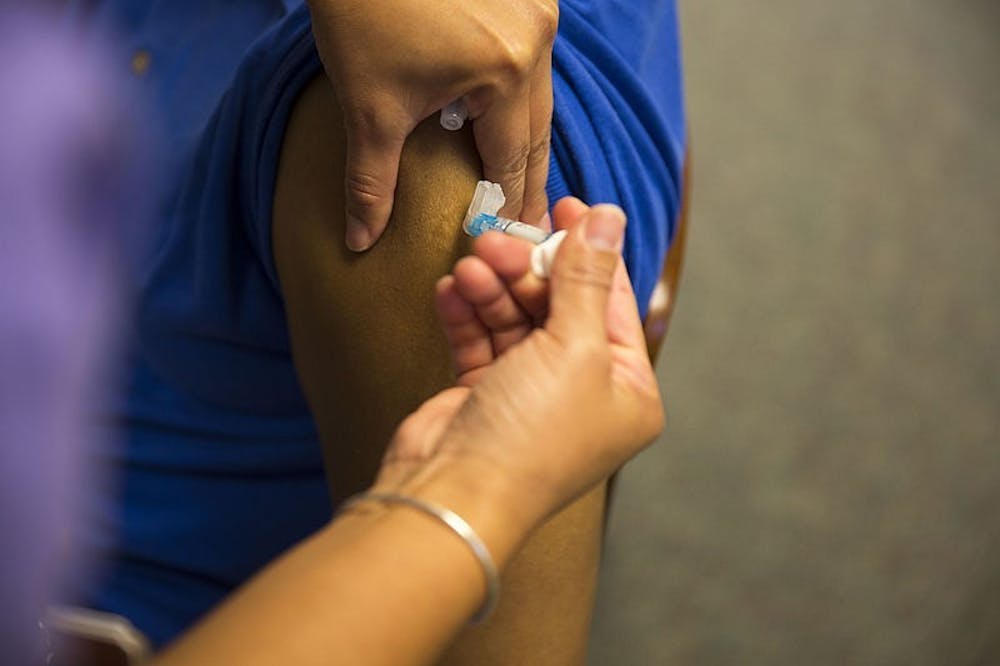Lea en español
The University’s Student Health and Wellness Center has canceled its annual flu shot clinic due to concerns about COVID-19 transmission, but the University is still encouraging students and faculty to get vaccinated through other means as the ongoing pandemic threatens to make this year’s influenza season even more complex.
“We surveyed the availability of flu vaccine locally and determined that students would have access to flu shots at multiple accessible locations,” said Jamie Leonard, director of the Office of Health Promotion, in an email to The Cavalier Daily.
Student Health and Wellness plans to set up a station Monday at the Student Activities Building to inoculate students. As students report for their mandatory COVID testing, they will also have the option to get a flu shot. Prevalence testing appointments, instead of walk-ins, will guarantee that students arrive in appropriate intervals to maintain social distancing.
The University anticipates about two hundred flu shots every day at this station, for a total of 4,000 vaccinations from Oct. 26 to Nov. 20. They hope to get this up and running by the end of October. Last year, the annual flu clinic administered 1,542 vaccinations.
According to the Student Health and Wellness center, getting a flu shot is the most effective way to prevent infection and helps reduce the strain on U.Va. medical services. Data collected in February of 2020 found that 63 percent of the University undergraduate population reported being vaccinated against the flu in the previous year.
The University recommends students get a flu shot by the end of October. Through the HealthyHoos Patient Portal, students can schedule an appointment to get vaccinated. Starting on Oct. 31, Student Health and Wellness will expand availability by offering weekend appointments. Although vaccines at Student Health and Wellness incur a $30 charge that is covered by the Aetna Student Health plan and can be reimbursed by other insurance plans.
CVS on the Corner or Barracks Road accepts most insurance and takes walk-ins, but they strongly recommend making an appointment online first. Other locations to get a flu shot include Kroger, Top Notch Family Pharmacy and Wegmans.
University faculty and staff are encouraged to get vaccinated as well. Through a partnership with CVS and Aetna, University employee vaccinations are covered by their health plan and they can get a flu shot at CVS or other pharmacies.
The Student Health and Wellness center is promoting flu vaccinations through social media, email and U.Va. newsletters. Information about flu shots was also sent out to parents in an email from Patricia Lampkin, vice president of student affairs.
COVID-19 and influenza are both contagious respiratory diseases with similar symptoms. According to the Center for Disease Control, some of these symptoms are fever, cough and difficulty breathing. It is hard to tell the difference between coronavirus and the flu without testing, which makes the diagnosis and management of COVID cases at the University more difficult. Since these viruses are so similar, most students with symptoms will be tested for both.
The influenza virus is spread by droplets in the air from a sneeze or cough of someone infected, or by touching an infected surface and then touching your mouth or nose. Social distancing and other measures against COVID protect against the spread of the flu as well.
The University encourages students to continue washing hands regularly, wear face coverings and focus on their health and wellbeing by getting regular sleep and exercise.
“At this time, we do not have medications to treat COVID-19 unless someone is hospitalized due to severe symptoms,” said Meredith Hayden, associate executive director of Student Health and Wellness, in an email to the Cavalier Daily. “However, there are a number of medications available to treat influenza, which can shorten the duration of symptoms and decrease the risk of disease progression.”
Influenza medications that are readily available include the antiviral drugs Tamiflu and Relenza, and the over-the-counter anti-inflammatory drugs Tylenol and Advil, which can reduce symptoms.
According to Hayden, the number of flu cases at the University usually follows state and regional trends — when flu cases rise in Virginia, they tend to rise at the University. Factors that influence the spread of influenza include the rate of vaccination, the “match” of the vaccine to the influenza strains and student behavior.
The University urges infected students to stay home and away from others until 24 hours have passed without a fever. Influenza data is tracked on the Virginia Department of Health website.







